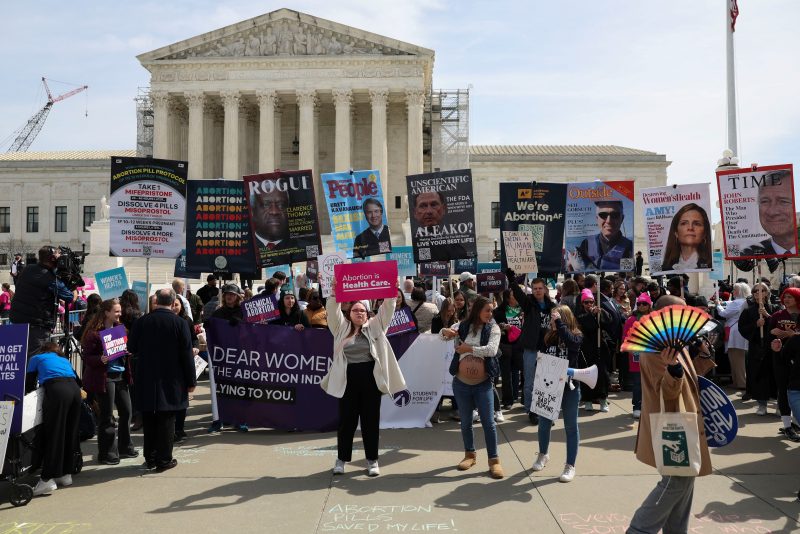The Supreme Court on Tuesday seemed unlikely to limit access to mifepristone, a key medication that is used in more than 60 percent of U.S. abortions and has emerged as the next front in the battle over how and whether women can terminate their pregnancies.
During nearly two hours of oral argument, a majority of justices from across the ideological spectrum expressed skepticism that the antiabortion doctors challenging the Food and Drug Administration’s loosening of regulations for the long-approved medication have suffered the type of direct harm that would give them sufficient legal grounds to bring the lawsuit.
The Biden administration and the drug’s manufacturer urged the justices to reverse a lower-court ruling that would make it more difficult to access mifepristone, in a case that centers on the role of government agencies in regulating medicine and returns the issue of abortion to the high court less than two years after the conservative majority overturned Roe v. Wade.
Several justices, including Chief Justice John G. Roberts Jr. and Justices Neil M. Gorsuch and Ketanji Brown Jackson, seemed interested in a narrow ruling that would not address the underlying regulatory or safety questions in the case, but would retain existing levels of access that allow patients to use mifepristone later into pregnancy and obtain the medication directly by mail.
Gorsuch, a nominee of President Donald Trump, joined Jackson, a nominee of President Biden, in emphasizing that the Supreme Court often says its rulings should address the alleged harm at issue and go no further.
“This case seems a prime example of turning what could be a small lawsuit into a nationwide legislative assembly on an FDA rule or any other federal government action,” Gorsuch told the attorney representing the organization of antiabortion doctors.
Jackson said there is a “significant mismatch” between the claims made by the antiabortion doctors and their lawsuit “seeking an order preventing anyone from having access to these drugs at all.”
Since the Supreme Court eliminated the nationwide right to abortion in 2022, medications to terminate pregnancies have increased in importance, because patients can get them by mail and take them at home — including in states that have severely limited or banned abortions. They have been targeted in litigation for the same reasons.
If the justices allow last year’s appeals court ruling to stand, mifepristone would still be available in the United States, but patients would have to obtain it in person, not by mail, and could use it only up to seven weeks into pregnancy even in states where abortion is legal.
Tuesday’s arguments included several strikingly candid and detailed exchanges about reproductive health among the four female justices and three female lawyers standing before them at the lectern — questions that perhaps would not have flowed as easily had all of the justices and lawyers been male.
Justice Amy Coney Barrett, for example, referred to a procedure known as dilation and curettage, or D&C, which clears out the uterus after an abortion or miscarriage. She also spoke of a dangerous condition where a fetus implants outside the uterus, asking Solicitor General Elizabeth B. Prelogar how it was possible “to detect an ectopic pregnancy without an ultrasound.”
All three justices nominated by Trump — Gorsuch, Barrett and Brett M. Kavanaugh — seemed likely to side with the FDA. Both Barrett and Kavanaugh sought assurances from Prelogar that doctors who have moral objections to abortion are already shielded by federal law from having to perform or assist in the procedure, if a patient experiences complications from taking mifepristone.
The toughest questions for the Biden administration and Danco Laboratories, the company that makes mifepristone, came from the court’s two most conservative justices, Clarence Thomas and Samuel A. Alito Jr., both of whom seemed sympathetic to the claims of the antiabortion doctors and their right to sue.
“Your argument is that it doesn’t matter if FDA flagrantly violated the law, it didn’t do what it should have done, endangered the health of women, it’s just too bad, nobody can sue in court?” Alito pressed Prelogar.
The solicitor general rejected Alito’s suggestion that the FDA would allow dangerous drugs to remain on the market. The FDA, she said, “takes very seriously its responsibility to ensure the safety of drugs.”
Both Alito and Thomas alarmed abortion rights advocates when they asked about a long-dormant law from the 1870s that bans the mailing of “obscene” materials, including materials used for abortions. If enforced, the Comstock Act could immediately halt the mailing of abortion pills — or, some experts say, even stop legal abortions nationwide.
While the Biden administration has issued guidance saying that the federal government will not enforce the laws, a future administration seeking to restrict abortion could choose to do so.
In briefs filed ahead of Tuesday’s arguments, pharmaceutical companies and former FDA officials warned the court not to second-guess the agency’s scientific judgments. A ruling against the FDA, they said, would destabilize the regulatory system and jeopardize investments in research and innovation.
The lawsuit challenging mifepristone originated when abortion opponents sued the FDA, saying the agency unlawfully loosened regulations for the drug without properly assessing safety data and potential risks for patients.
The FDA, considered one of the world’s most stringent regulators, has repeatedly found the two-step medication-abortion protocol that includes mifepristone to be a safe and effective alternative to surgical abortions. The agency relied on dozens of studies involving thousands of patients to approve mifepristone, which has been used by millions of women to terminate pregnancies.
In 2016, the FDA said it would allow the drug to be used up to 10 weeks into pregnancy, instead of seven; permitted health-care providers other than doctors to prescribe mifepristone; and reduced from three to one the number of required in-person visits. In 2021, the FDA allowed the drug to be sent directly to patients by mail without an in-person medical consultation. Leading studies have shown that these changes do not affect the safety or efficacy of the medication.
Much of the discussion at the Supreme Court on Tuesday centered on the question of whether the antiabortion challengers have a sufficient legal basis or standing to file the lawsuit. Lawyers defending the drug repeatedly said the challengers were not directly harmed by the FDA’s loosening of regulations.
“We don’t think they come within a hundred miles of the kind of circumstances this court has previously identified” as the type of direct harm needed to bring a case, Prelogar said.
The individuals behind the lawsuit “do not use this product, do not prescribe this product, and have a conscience right not to treat anyone who has taken this product,” said Danco attorney Jessica Ellsworth. “Those individuals want to prevent anyone else from using it in line with FDA’s considered scientific judgment.”
Erin Hawley, an attorney for the mifepristone challengers, said her clients, who oppose abortion on moral and religious grounds, suffer “conscience harms” when they have to intervene to treat a patient who experiences a complication after taking the medication.
The doctors “object not only to taking the life of an unborn child during an elective abortion but also to ‘completing that process,’” said Hawley, a senior attorney with Alliance Defending Freedom, a Christian conservative legal organization.
But several justices, including Barrett and Elena Kagan pushed back on the statements from doctors included in the group’s court filings, asking for examples of when Hawley’s clients were enlisted to provide objectionable emergency treatment.
“You need a person to be able to come in and meet the courts’ regular standing requirements,” Kagan told Hawley. “So who’s your person?”
After Hawley pointed to the objections of two specific doctors, Barrett followed up, saying it was unclear whether they had personally been enlisted in an emergency to perform an abortion.
“The difficulty here is that, at least to me, these affidavits do read more like the conscience objection is strictly to actually participating in the abortion to end the life of the embryo or fetus,” Barrett said, adding that she did not interpret the doctors’ statements “to say that they ever participated in that.”
The lawsuit was brought by the Alliance for Hippocratic Medicine, a group of antiabortion doctors, and some individual physicians. They filed it in Amarillo, Tex., where the only sitting federal judge is Matthew Kacsmaryk, a Trump nominee well known for his long-standing opposition to abortion.
Kacsmaryk sided with the challengers last April and suspended approval of mifepristone, which was first cleared for use in the United States in 2000. It was the first time a judge suspended longtime approval of a medication despite opposition from the FDA and the drug’s manufacturer. The ruling embraced language used by antiabortion activists, referring to abortion providers as “abortionists” and to fetuses and embryos as “unborn humans.”
The federal government and Danco appealed Kacsmaryk’s ruling, and the conservative U.S. Court of Appeals for the 5th Circuit reversed the order suspending the drug’s initial approval. But a three-judge panel said the FDA’s loosening of restrictions starting in 2016 was unlawful.
In that ruling, Judge Jennifer Walker Elrod wrote that the FDA “failed to consider the cumulative effect of removing several important safeguards at the same time.”
The Supreme Court will issue its ruling on the matter by the end of this term, probably in late June or early July.
Abortion providers across the country already have plans in place for how to change their operations if mifepristone is restricted. Many telehealth providers are planning to offer patients a different medication-abortion regimen that uses only misoprostol, the second medication in the current two-step process.
A misoprostol-only abortion protocol, used widely around the world, is also extremely safe and effective, but is often more difficult for the patient, causing significantly more cramping and bleeding.
The case is Food and Drug Administration v. Alliance for Hippocratic Medicine.
Daniel Gilbert contributed to this report.





























